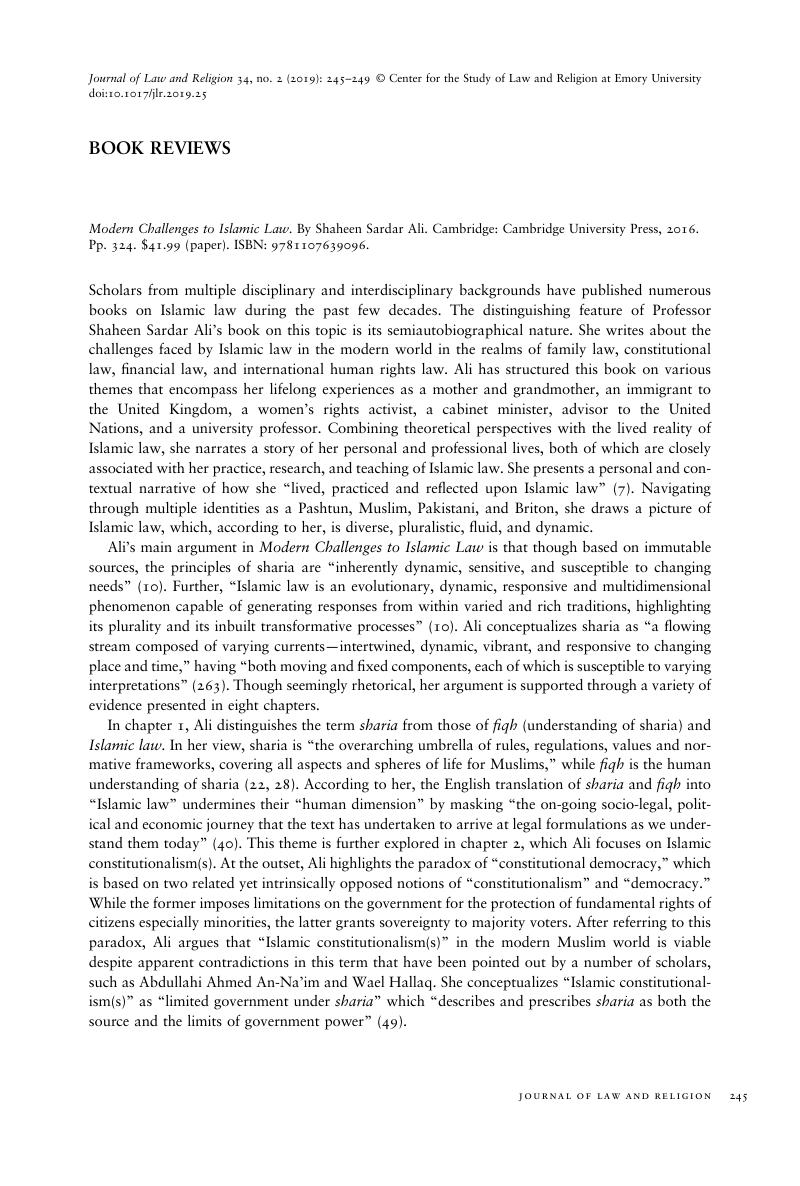No CrossRef data available.
Article contents
Modern Challenges to Islamic Law. By Shaheen Sardar Ali. Cambridge: Cambridge University Press, 2016. Pp. 324. $41.99 (paper). ISBN: 9781107639096.
Review products
Published online by Cambridge University Press: 04 September 2019
Abstract

- Type
- Book Review
- Information
- Copyright
- Copyright © Center for the Study of Law and Religion at Emory University 2019
References
1 In his critique of the dominant historiography of Islamic law, Amr. Shalakany identifies the tradition/modernity dichotomy as one of its key features during the postcolonial period, whereby sharia is characterized as tradition and Western-inspired state law as modern. Shalakany, Amr. A., “Islamic Legal Histories,” Berkeley Journal of Middle Eastern and Islamic Law 1, no. 1 (2008): 1–82, at 24–27Google Scholar.
2 For details see, Robinson, Francis, “Technology and Religious Change: Islam and the Impact of Print,” Modern Asian Studies 27, no. 1 (1993): 229–51CrossRefGoogle Scholar.
3 The critics of Imam Abu Hanifah charged him for his departure from ahadith by using qiyas or istihsan. Hanafi jurists, however, refuted this criticism. Hassan, Ahmad, Analogical Reasoning in Islamic Jurisprudence (Islamabad: Islamic Research Institute, 1982), 420–22Google Scholar.
4 See Fadel, Mohammad, “The Social Logic of Taqlīd and the Rise of the Mukhataṣar,” Islamic Law and Society 3, no. 2 (1996): 193–233CrossRefGoogle Scholar; Vikør, Knut S., Between God and the Sultan: A History of Islamic Law (London: Hurst, 2005), 160–61Google Scholar; Hallaq, Wael B., Authority, Continuity and Change in Islamic Law (Cambridge: Cambridge University Press, 2001), xii, 239CrossRefGoogle Scholar.
5 Stephens, Julia, Governing Islam: Law, Empire, and Secularism in South Asia (Cambridge: Cambridge University Press, 2018), 170–71CrossRefGoogle Scholar.
6 Saleem Ahmed v. Government of Pakistan PLD 2014 PLD 43, 57.
7 Khurshid Bibi v. Baboo Muhammad Amin PLD 1967 SC 97.
8 Abdul Rashid v. Shahida Parveen 2013 YLR 2616 (Life spent by the wife with her husband could be considered consideration for khul‘.). Nasir v. Rubina 2012 MLD 1576 (The period of wedlock of the spouses, the birth of the children during the wedlock and second marriage of the husband can preclude the courts to order the return of dower to the husband.).
9 In March 2015, the legislature in Punjab amended the Family Courts Act 1964 to provide that upon khul‘, a wife must return 50 percent of deferred dower or 25 percent of her paid dower. Section 8 of the Family Courts (Amendment) Act 2015 amends section 10(5) of the Family Courts Act 1964.




